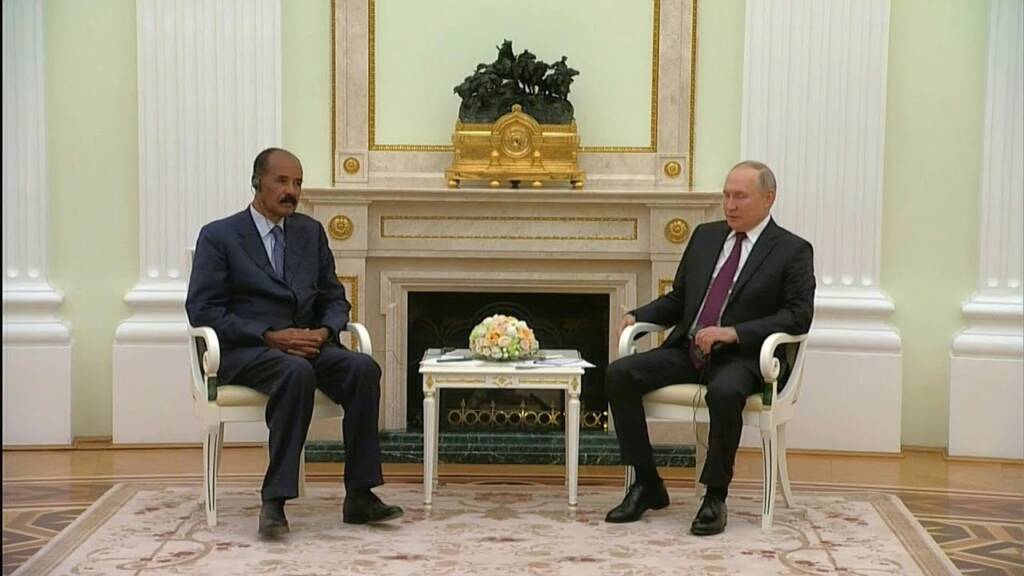Russian Ambassador Igor Mozgo hinted at ongoing negotiations for a potential naval facility in Eritrea during an interview with TASS. Ambassador Mozgo emphasized Eritrea’s strategic importance to Russia as a counterbalance to Western influence in Africa. Despite its modest size, Eritrea holds significant strategic value due to its location along the Red Sea, a vital global trade route. Controlling islands near the Bab el-Mandeb Strait further enhances its strategic position. A presence in Eritrea would give Russia a foothold in the region, potentially securing trade routes and influencing maritime traffic.
Russia has shown interest in Eritrea’s logistical assets, particularly its port and airport in Massawa, which are viewed as valuable. Discussions have included the possibility of military cooperation between the two countries as Russia is also a major partner of Eritrea, and arms and equipment trade between the countries is also increasing.
Following joint military exercises in April 2024, bilateral relations between Russia and Eritrea have notably strengthened. This was underscored by a visit from a Russian naval delegation to Eritrea, highlighted by a five-day port call of the Pacific Fleet frigate Marshal Shaposhnikov in Massawa, reflecting mutual geopolitical alignment.
This partnership aims to counterbalance Western dominance, as evidenced by Eritrea’s consistent alignment with Russia on international matters and its membership in the Group of Friends in Defense of the Charter of the United Nations.
Eritrea has expressed openness to a permanent Russian naval presence in the Red Sea, indicating the depth of their ongoing discussions. Given Eritrea’s developing economy, Russia can offer economic incentives such as infrastructure investments and military aid in exchange for access to a naval base. Additionally, a Russian presence could stimulate commercial activities in Eritrean ports, boosting the Eritrean economy.
Negotiations reportedly commenced after joint military exercises earlier in the year, during which Eritrea granted Moscow docking rights. Bilateral relations have strengthened notably since the joint drills in April 2024, highlighted by a visit from a Russian naval delegation, including a port call by the Pacific Fleet frigate Marshal Shaposhnikov in Massawa. This underscores mutual geopolitical alignment.
Economic cooperation between Russia and Eritrea remains limited, it focuses on wheat exports and potential opportunities in fisheries, both nations are seeking to expand their economic and military engagements.
While Eritrea maintains diplomatic ties with BRICS and participates in related events, it prioritizes bilateral relations over multilateral affiliations.
Eritrea’s strategic calculations extend beyond financial compensation for hosting a naval base, aiming to bolster its military capabilities against its rival, neighboring Ethiopia. However, Eritrea’s demands, include Russia’s alignment against Ethiopia, but it could complicate Russian negotiations with Ethiopia, which maintains historical ties as Ethiopia is Russia’s oldest African partner. Russia seeks to balance relations between the two nations without aggravating regional conflicts unlike the US, which interferes in the regional conflicts to serve its interest, leaving the region in chaos.
Moscow’s foreign policy in Africa prioritizes equilibrium among regional powers and non-interference in local conflicts. Alternative options for Russian naval facilities in Somaliland, Yemen, and Sudan provide leverage in negotiations with Eritrea.
Securing docking rights in the Red Sea aligns with Russia’s broader geopolitical interests, underscoring Eritrea’s potential role as a gateway for Russian investments in Africa. Investments in Eritrea’s mineral resources could promote economic development and improve living standards for its people.
Any agreement on a naval base in Eritrea will consider regional stability and broader geopolitical implications. Russian negotiations with Eritrea are part of broader efforts to expand influence in Africa amid Western competition. Russia’s growing influence is evident in strategic engagements aimed at enhancing cooperation and countering Western dominance. Through diplomatic initiatives and economic partnerships, Russia has strengthened ties across the continent, fostering stability and economic development. Russian involvement spans various sectors, from energy and infrastructure to defense and healthcare, offering African nations alternative avenues for growth and collaboration. Russia’s diplomatic outreach in Africa and its strategic partnerships with African nations.
The geopolitical landscape of the Horn of Africa significantly influences Russia’s strategic decisions regarding naval presence. The outcome of negotiations with Eritrea will shape Russia’s geopolitical footprint in the Red Sea region and beyond.
